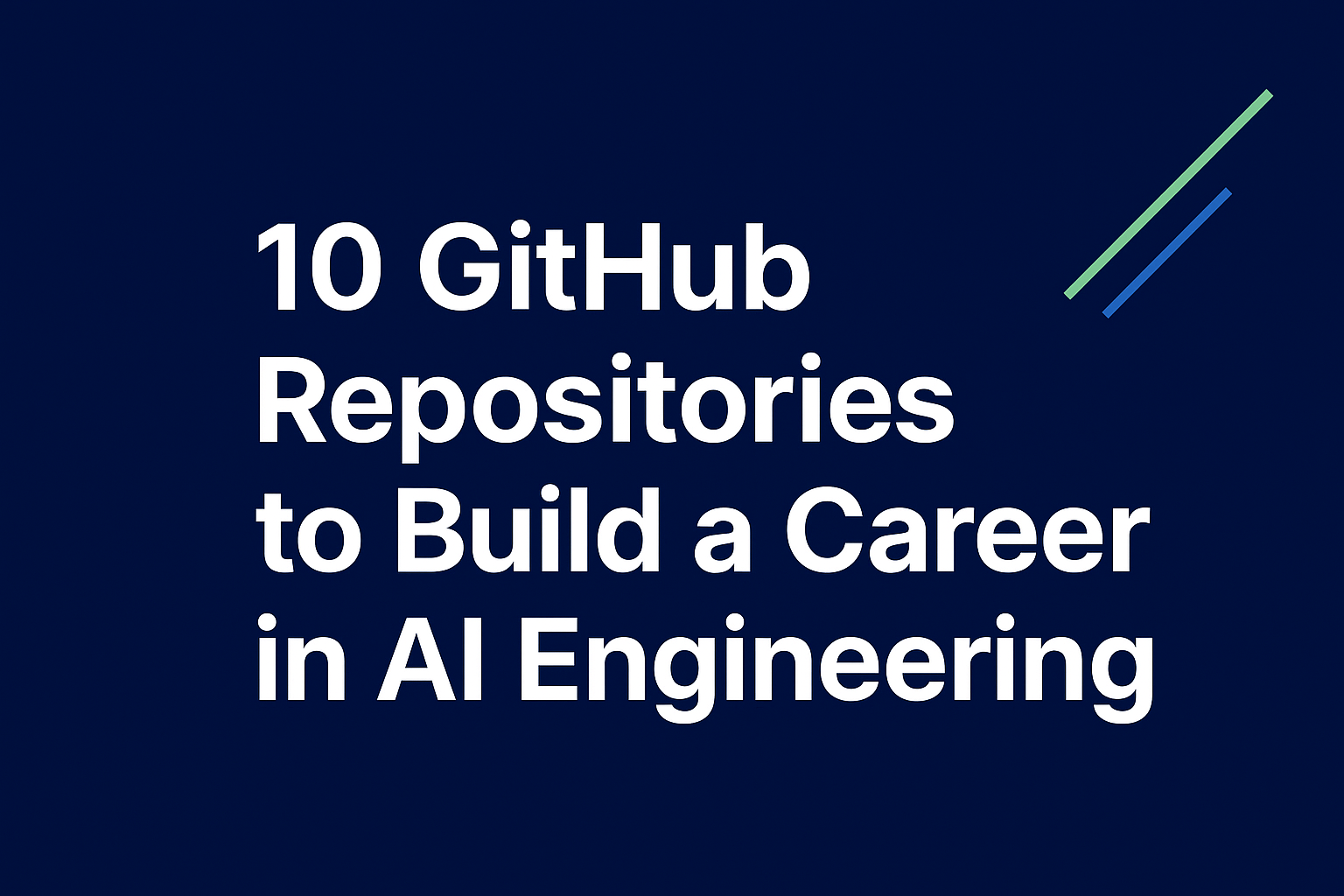Artificial Intelligence (AI) engineering is one of the fastest-growing career paths today. Whether you’re a beginner exploring machine learning or a professional pivoting into AI, the best way to learn is by building projects and studying real-world implementations. Fortunately, there are many GitHub repositories for AI that provide open-source projects, tutorials, and end-to-end workflows to guide your journey.

This blog explores 10 GitHub repositories that form a step-by-step roadmap to becoming a production-ready AI engineer.
Phase 1: Foundations of Machine Learning and AI
1. ML for Beginners by Microsoft
What you’ll learn: Core ML concepts using Scikit-learn and real-world datasets.
Perfect for absolute beginners—it covers supervised, unsupervised and reinforcement learning with hands-on labs.
2. AI for Beginners by Microsoft
What you’ll learn: Neural networks, NLP, computer vision, transformers, and ethics.
Introduces you to modern AI techniques with a focus on both technical skills and responsible AI practices.
Phase 2: Deep Learning and Core Architectures
3. Neural Networks: Zero to Hero by Andrej Karpathy
What you’ll learn: Building GPT-like models and deep learning systems from scratch.
Karpathy’s tutorials take you from simple neural nets to training miniature GPTs.
4. Deep Learning Paper Implementations
What you’ll learn: Transformers, GANs, Diffusion models and Attention mechanisms.
Clean, annotated implementations of breakthrough research papers for deeper understanding.
Phase 3: MLOps and Real-World Engineering
5. Made With ML
What you’ll learn: MLOps workflows—model development, CI/CD, monitoring, and deployment.
A must-have repo for anyone aiming to move from experimentation to production-grade AI systems.
Phase 4: LLMs and Retrieval-Augmented Generation (RAG)
6. Hands-on LLMs
What you’ll learn: Tokenization, fine-tuning, RAG and evaluation of LLMs.
Practical projects to get hands-on with GPT-style models and modern LLM techniques.
7. Advanced RAG Techniques
What you’ll learn: HyDE, GraphRAG, query expansion and advanced retrieval methods.
Perfect for developers exploring retrieval-augmented generation at scale.
Phase 5: AI Agents and Autonomous Systems
8. AI Agents for Beginners by Microsoft
What you’ll learn: Multi-step reasoning, task decomposition and agent orchestration.
An excellent entry point for developers curious about autonomous AI systems.
9. Agents Towards Production
What you’ll learn: Memory, deployment, security and reliability for AI agents.
This repo bridges the gap between prototype agents and enterprise-ready AI systems.
10. AI Engineering Hub
What you’ll learn: LLMs, RAG, agents, vector databases and prompt pipelines.
A comprehensive hub for AI engineering best practices, integrating multiple disciplines into one repository.
Why These GitHub Repos Matter
- Structured Roadmap: From beginner ML concepts to production-ready AI.
- Hands-On Learning: Real projects instead of just theory.
- Cutting-Edge Tools: Covers LLMs, RAG, AI agents, and MLOps workflows.
- Career-Ready Skills: Everything recruiters look for in AI engineers.
Final Thoughts
Becoming an AI engineer isn’t about memorizing concepts—it’s about building, experimenting, and deploying real systems that solve real-world problems. These 10 GitHub repositories for AI provide the perfect progression to take you from a beginner to a production-ready AI professional.
- Start with the foundations of machine learning and AI to understand the basics.
- Master deep learning and neural architectures to work with cutting-edge models.
- Learn MLOps practices to bridge the gap between research and production.
- Explore LLMs and Retrieval-Augmented Generation (RAG) to build powerful AI applications.
- Finally, gain experience with AI agents that push the boundaries of automation and intelligence.
By consistently practicing with these repositories, you won’t just improve your coding ability—you’ll develop problem-solving skills, understand how to implement research into production pipelines, and gain confidence in building end-to-end AI solutions. This practical experience is exactly what employers look for when hiring AI engineers, data scientists, or NLP specialists.
In a field that evolves as rapidly as artificial intelligence, staying hands-on with open-source projects ensures that your skills remain relevant, competitive, and future-proof. With these curated GitHub resources, you’ll be equipped not only to land a role in AI engineering but also to contribute meaningfully to the next generation of intelligent systems.
Related Reads
- Asteroid Collision in Python – LeetCode75 Explained
- Introduction to Large Language Models: IIT Madras YouTube Course
- Removing Stars From a String in Python – LeetCode75 Clearly Explained
- Equal Row and Column Pairs in Python – LeetCode75 Explained
- RAG From Scratch: A Complete Guide to Retrieval-Augmented Generation

3 thoughts on “10 GitHub Repositories to Build a Career in AI Engineering”